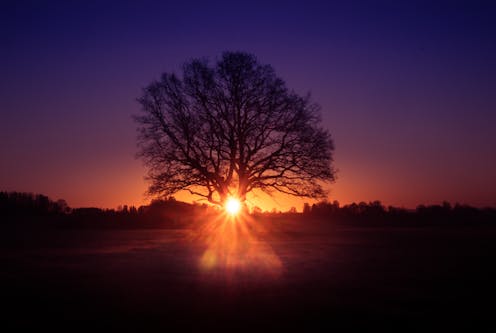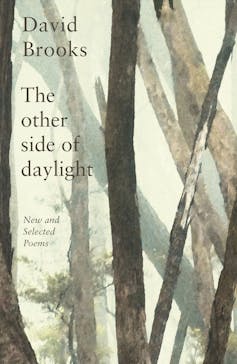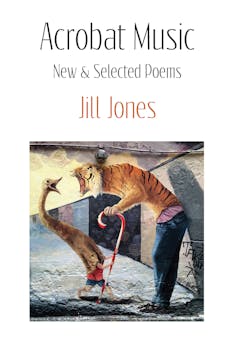
As a way to gather poetry from across a career, a “selected” is not as unwieldy or as final-sounding as a “complete” or “collected” edition. The even more popular “new and selected” helps old poems reach a new audience, while offering established readers some of the poet’s latest work.
As Jill Jones notes in her latest collection, Acrobat Music: New and Selected Poems, there are practical issues as well. Poetry volumes tend to go out of print and are unlikely to be digitised. A selected edition, then, is a way to raise poems out of oblivion, as much as it is a chance to demonstrate and reflect upon the development of the style and ongoing themes of a writer.
Review: The Other Side of Daylight: New and Selected Poems – David Brooks (University of Queensland Press) & Acrobat Music: New and Selected Poems – Jill Jones (Puncher and Wattmann)
When is the best time to release a selected edition? Jones published Screens Jets Heaven: New and Selected Poems way back in 2002. It gathered poetry from her earliest volumes, including the first, The Mask and the Jagged Star, which had been published by the New Zealand-based Hazard Press a decade earlier.

Jones has now published 13 full-length poetry collections. Her contemporary David Brooks, who has recently released The Other Side of Daylight: New and Selected Poems, has published five, the earliest being The Cold Front in 1983. He has also been busy during the subsequent decades publishing four novels, four short fiction collections, and seven non-fiction volumes.
Jones and Brooks are both illustrious and award-winning writers, but they have also nurtured the community around them. Jones co-ran BlackWattle Press and the journal Cargo. Brooks is a former editor of the literary journal Southerly. Both have had jobs in academia, fostering subsequent generations of writers.
In The Other Side of Daylight, Brooks recalls the Canadian poet Mark Strand gifting him his personal copy of Ezra Pound’s Personae when another couldn’t be found. He notes how the generosity he experienced as an emergent writer was something he has tried to pass on.
The other side of daylight
Poetry has been at the core of Brooks’ writing, but it cannot be forced. In Golden Tongues, he notes:
four or five
in a rush
and then nothing
[…]
you turn around
and the words aren’t there.
He describes poems as
life
rising out of nowhere,
needing you for something – an errand – urgently.
In an interview, Brooks observed that the 20 year gap between his first and second poetry collections was due to the influence of Czeslaw Milosz, who made him reflect on how “to situate my lyrical impulses historically, politically and metaphysically”.
Poetic affinities are part of the weave of his work, from the echo of Rainer Maria Rilke’s phrase “the other side of nature” in the title of The Other Side of Daylight to the elegies for writer friends, such as the poet Richard Deutch.

Brooks’ most recent poems, which open the volume, evoke a sense of communion with one’s environment and fellow beings that comes with time. Many speak not only of animals’ sentience, but an empathetic community that contrasts with the violence and disregard humans show towards their environment and each other.
In Romanée-Conti, for example, the poet views the obscene price of a bottle of wine within a global economy of exploitation and suffering, concluding:
The saddest and most appalling thing is that although by now
it will probably taste like an old priest’s piss,
the price sounds about right.
Another poem critiques kangaroo leather through the image of kangaroos leaping towards Boston and its famous marathon. At times, there is a sense of despair at the inability to make interventions, whether by poetry (“No one is listening to the poets,” Brooks writes in Farewell to the Long Sad Party) or by deed – as in Taralga Road, where the poet tries to rescue a joey from being one more roadkill statistic.
What becomes powerful is Brooks’ capacity to redress indifference by conveying the character of animals. An Invasion of Clouds depicts a study being overtaken by a small group of sheep:
the black one, turning his back,
slowly and sensually rubs his behind
on the literary theory section of the bookshelf.
The sheep leaves with a final pleasurable pee “on the just-washed floor”. As a metaphor of the limitations of literary criticism, it is glorious.

Brooks’ lyricism is deeply personal, even when he is reflecting on broader historical or global patterns. “Captain Hunter and the Petrels”, for instance, frames a story of colonial survival at the expense of a bird species through an account of Brooks buying books on his way to see the late Andrew Burke, the friend and fellow poet to whom The Other Side of Daylight is dedicated.
Reading back through the volume to earlier work, we can see how Brooks’ recent poems consolidate his past thinking, and how some are paeans to enduring love. We are provided with insights into animal grief and sociability, the latter found through different forms of language, as in Each Other’s Tongue, where both man and sheep
murmur about moonlight,
for a brief moment.
Another earlier poem, Damage, seems to reflect on what it might mean to be on the “other side of daylight”:
damage is […] the gap
between what we are
and what we have been thinking
that we could be.
There is the capacity “to think of life differently” and “always greater care to be taken”. Brooks concludes that
pain and error and regret are a
kind of light in themselves
and that
In the dark one can sometimes see
so much more clearly than in the day.
Acrobat music
By contrast, there is no deeper symbolism in many of Jones’ poems. In This Crumbling Aura, she states:
Sometimes the dark is just the way a room is
or that part of a blink that flicker of closing.
While Brooks grounds the self in partners, animals, friends and the mountains, Jones is open to a mercurial form of the self and its many versions. Her poem The Beautiful Anxiety finds that anxiety arises from the fact there is “never time to know / yourself” when one is “moving”.
“Damage,” she adds, “seems almost a necessity.”
In Possible Manners of Revelation, Jones writes:
I deface all my damage because the world won’t forgive me
I recite a history of my own breath, which is the poem.
This has something of a queer resilience to it. Feeling “blue” features frequently in Jones’ poetry, but she rejects the idea of sitting with it. Instead, she favours methodological wandering and intellectual curiosity. Her “acrobat music” flies with language and change.
She navigates the absurdities and reductions of urban living. As she declares in Leaving it to the Sky:
I don’t believe in fake tans, but I could. All around are little dogs. Hail, queens of suburbia! Every so often, it’s the age of beige.
She adds:
Do I lack an overarching narrative? […] give me Iced Vo-vos, cups of strong tea, and a work ethic.
The poem Wave transposes the weaving of cars in city traffic into a series of rearranged words, finding that “with numbers, each […] is beautiful [in] its own exhaust”.
Desire features in both Brooks’ and Jones’ poetry. Where much, though not all, of the desire in Brooks’ poetry is understood through the gaze, Jones focuses on the sass and bliss of bodily movement, which she calls “our thousand dances”. She describes
all of them older
all of them younger all now
still lifting above the roof.[…] in fabulous style […] with these two arms.
The “best of” feel of a selected edition might wield some canonical clout, but it can also flatten a diverse oeuvre. Jones notes that Acrobat Music contains none of her longer sequences or her more linguistically experimental poems.
Yet the volume still includes prose poems, braided poems, a poem called Difficult Poem, the Sapphic fragment Some ( ) Time, and the short but wonderful ekphrastic sequence Touches / Touches Us.

The omissions have not stopped Acrobat Music from being an exhilarating new ride through Jones’ work. She has deliberately sought to disrupt a sense of chronology by grouping poems across five clusters, with a sixth section of previously unpublished poems. As she notes, the company these poems now keep might be through sound or affect as much as thematic or formal connection.
Where Brooks and Jones intersect is their detailing of everyday and intimate life as a springboard for wider reflection. The work of both poets also draws attention to environmental changes. In Easter 2016, his revision of W.B. Yeats’ Easter 1916, Brooks implores Australian culture to stop its destructive practices. Jones, in her poem Disrepair, likens our situation to being in a leaking boat that requires caulking “we’ve no time to give”, listening to “more than half-silent scrapings of midnight”. In Hope for Whole, the title poem of a 2018 anthology speaking out against Adani, she nevertheless argues for a holistic hope.
Many of the prescient and memorable poems in these two new and selected volumes stay with you long after reading. In being selected rather than complete editions, we can look forward to more from both poets. As Jones concludes in her recent poem Gone In Terrain,
Nothing is
ever finished.
Ann Vickery does not work for, consult, own shares in or receive funding from any company or organisation that would benefit from this article, and has disclosed no relevant affiliations beyond their academic appointment.
This article was originally published on The Conversation. Read the original article.







